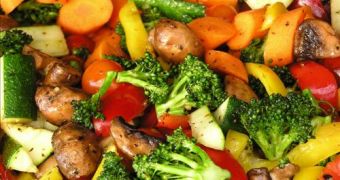By now, this is the deadliest type of cancer among women. Survival rate is poor, especially in the case of the common and aggressive types. A new research presented at the annual meeting of the American Association for Cancer Research, April 12-16, in San Diego, CA, and carried out by a team led by Dr. Susan E. McCann, Division of Cancer Prevention and Population Sciences, Roswell Park Cancer Institute, shows that a plant-based diet rich in cancer-fighting lignans could increase the chances of survival among postmenopausal women with breast cancer.
Lignans are plant chemicals encountered in seeds (flax seed and sesame seed represent the richest source, but sources of lignan are represented also by pumpkin seeds), whole grains (rye, wheat, oat, barley), vegetables (broccoli, soybean and beans) and some berries. Lignans are a major type of phytoestrogens (plant estrogen-mimicking chemicals) which are also antioxidants. Other type of phytoestrogens are the isoflavones (from soy), and coumestans. Lab tests had revealed that lignans impact the hormone levels and tumor growth.
The research team assessed the dietary lignan consumption in the poll made of 1,122 women diagnosed with breast cancer who were involved in the Western New York Exposures and Breast Cancer Study (WEB Study) between 1996 and 2001. The levels of lignan consumption were determined based on responses to a questionnaire that assessed intake of over 100 foods. The results showed that the dietary lignan intake had no effect in the case of the premenopausal women with breast cancer. But in postmenopausal women, the rich lignan diet boosted survival by 70% comparing to the categories of women consuming less of the chemical.
"This study suggests that certain fruits and vegetables may offer more protection than others. Postmenopausal women diagnosed with breast cancer who reported high intakes of lignans, which in this study were supplied mostly by dark bread, peaches, broccoli, oranges, winter squash, strawberries, coffee and tea, had a statistically significant reduction in death rates," said McCann.

 14 DAY TRIAL //
14 DAY TRIAL //